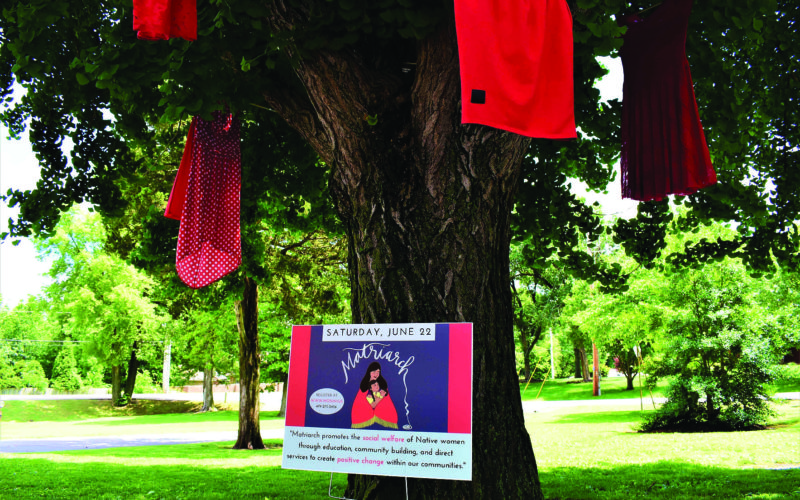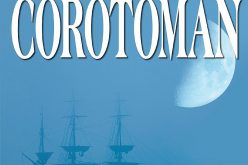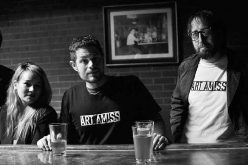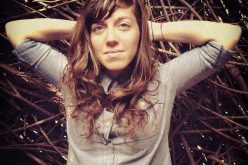Indigenous women seek own solutions
BECCA MARTIN-BROWN
bmartin@nwadg.com
“Choctaws are matriarchal and matrilineal, and that way of living is a great example of equity,” says Sarah Adams-Cornell. “This is especially important because Native women suffer at high rates of murder, abuse and incarceration under patriarchal society. We have an old way we can return to that values and honors lifegivers and brings balance.”
Adams-Cornell is the founder of an Oklahoma City organization called Matriarch, and she will be among speakers June 22 as part of the Native Conversations series at the Museum of Native American History in Bentonville. The topic is not just the danger of being a Native American woman in a time when American Indian women face murder rates that are more than 10 times the national average and homicide is the third leading cause of death among those women 10 to 24 years of age. It is also focused on how that matriarchal society can offer potential solutions.
“Matriarch came about because of a conversation I had with my friend and now co-founder of Matriarch, Kendra Wilson Clements,” Adams-Cornell explains. “We were discussing several Native youth suicides that had just occurred and how helpless we felt. We discussed the mental health crisis, and abuse happening within our families, and how we are always directed toward Western medicine to be helped. We decided to form a group and discuss topics that impacted our women and children in hopes that we would have the tools to save ourselves.”
Matriarch is now taking applications for the program’s fourth year, and “our only requirements are that applicants identify as indigenous women and can attend 75% of the meetings,” Adams-Cornell says. The Matriarch model “is based on three educational pieces,” she adds. “Learning about oppression and how it impacts our community — because you can’t heal it if you can’t name it; trauma healing and the many ways we break those cycles individually, together and in our families; and lastly, empowering and supporting our sisters to achieve whatever they set their sights on.
“We make sure we are relevant by polling our women on what they want to learn about and what’s impacting them,” she adds. “Part of the Matriarch model is making sure that each topic is taught by an indigenous woman. We also encourage each woman to bring her children with her because we know how important this information is in prevention for them.”
Although the program is based in Oklahoma, Charlotte Buchanan-Yale, the head of the Museum of Native American History, thought it was a timely opportunity to bring awareness to Northwest Arkansas.
“It is my belief as the director of the Museum of Native American History that by connecting the past to the present, we can heal the future and educate future generations,” she says. “I feel it is important for the museum to not only tell the story of the past, but to give dimension to our collective history.
“Since Mallory Taylor introduced me to Matriarch and the work they do, the stories of missing and murdered indigenous women have flooded my awareness,” Buchanan-Yale adds. “As young women, who of us could not have been in the wrong place at the wrong time that would have impacted our future?”
Adams-Cornell says she’s fine with an audience that might be largely Caucasian.
“Communities of color have the tools and knowledge they need to heal and continue to succeed,” she says. “Solutions should always come from within our communities — and we welcome allies to join us to support those efforts. Partnership and cross-collaboration are vital to systemic change. Engaging in conversations that lead to allyship and engagement are the seeds of dynamic policies that support equity.
“We hope participants will walk away with a better understanding of the Missing and Murdered Indigenous Women movement. We also encourage honest questions and dialogue so we can bridge build between our communities.”
Adams-Cornell says she didn’t always have her own connection to her Choctaw community.
“My grandparents attended Goodland Indian School, which was an Indian boarding school where they weren’t allowed to speak their language or practice their traditions and ceremony,” she recounts. “The intent of these schools was to assimilate indigenous children. My grandparents didn’t pass that cultural knowledge to my mother, so she wasn’t able to pass it to me. After graduation from Goodland, they married and moved to Oklahoma City, which is about four hours away from our tribe and makes it difficult to connect.
“I learned more about our ways and continue to learn from Choctaw elders and friends in the Oklahoma City area, my Matriarch sisters and, several years ago, through language, history, dance and regalia making classes at the Oklahoma Choctaw Tribal Alliance. Being Choctaw gives me a feeling of strength and connection to something much bigger than myself or the time I’m in.”
__
FAQ
Native Conversations:
Matriarch
WHAT — “Matriarch will host a workshop that centers on making handkerchiefs and how this item has been used in indigenous regalia, during mourning, in dance and as protection for water keepers at Standing Rock,” says Sarah Adams-Cornell. “They are also used cross culturally, and we look forward to open dialogue with attendees. The second part of the day will be a spoken word performance. Each woman will speak about one of the four letters of MMIW (Missing and Murdered Indigenous Women) to tell what each letter stands for and what it means to them. Our fifth woman will talk about statistics regarding MMIW. Each woman brings her own unique style of performance that also incorporates our indigenous languages. Our women will be dressed in red ribbon skirts, the signature color of the MMIW movement.”
WHEN — Workshop, 3 p.m. June 22; performance, 5:30 p.m. June 22
WHERE — Museum of Native American History in Bentonville
COST — Free; registration is required for the workshop
INFO — 273-2456, monah202@gmail.com






